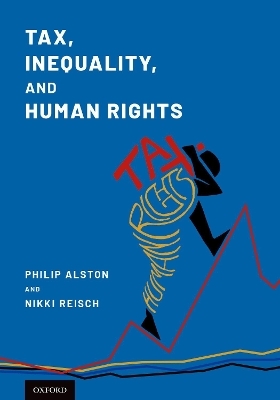
Tax, Inequality, and Human Rights
Oxford University Press Inc (Verlag)
978-0-19-088223-5 (ISBN)
In Tax, Inequality, and Human Rights, experts in human rights law and in tax law debate the linkages between the two fields and highlight how each can help to tackle rapidly growing inequality in the economic, social, and political realms. Against a backdrop of systemic corporate tax avoidance, widespread use of tax havens, persistent pressures to embrace austerity policies, and growing gaps between the rich and poor, this book encourages readers to understand fiscal policy as human rights policy, and thus as having profound consequences for the well-being of citizens around the world. Prominent scholars and practitioners examine how the foundational principles of tax law and human rights law intersect and diverge; discuss the cross-border nature and human rights impacts of abusive practices like tax avoidance and evasion; question the reluctance of states to bring transparency and accountability to tax policies and practices; highlight the responsibility of private sector actors for shaping and misshaping tax laws; and critically evaluate domestic tax rules through the lens of equality and nondiscrimination. The contributing authors also explore how international human rights obligations should influence the framework for both domestic and international tax reforms. They address what human rights law requires of state tax policies and how tax laws and loopholes affect the enjoyment of human rights by people outside a state's borders. Because tax and human rights both turn on the relationship between the individual and the state, neo-liberalism's erosion of the social contract threatens to undermine them both.
Philip Alston is the John Norton Pomeroy Professor of Law at New York University School of Law. He is also currently United Nations Special Rapporteur on extreme poverty and human rights. Nikki Reisch is the Legal Director of the Center for Human Rights and Global Justice at New York University School of Law, as well as a supervising attorney for the Global Justice Clinic.
Foreword, Winnie Byanyima, Executive Director, Oxfam International
Introduction, Philip Alston and Nikki Reisch (editors)
Part I: The Relevance of Human Rights to Tax Law, Policy, and Practice
1. Nikki Reisch, Taxation and Human Rights: Mapping the Landscape
2. Olivier De Schutter, Taxing for the Realization of Economic, Social and Cultural Rights
3. Sandra Fredman, Taxation as a Human Rights Issue: Gender and Substantive Equality
4. Mitchell Kane, Tax and Human Rights: The Moral Valence of Entitlements to Tax, Sovereignty, and Collectives
5. Allison Christians, The Search for Human Rights in Tax
Part II: Tax Abuse in Global Perspective: Cross-Border Dimensions and International Responses
6. Alex Cobham, Procuring Profit-Shifting: The State role in tax avoidance
7. Niko Lusiani and Mary Cosgrove, A Strange Alchemy: Embedding Human Rights into Tax Policy Spillover Assessments
8. Annet Wanyana Oguttu and Monica Iyer, Tax Abuse and Implications for Human Rights in Africa
9. Michael Lennard, Some Aspects of the Architecture of International Tax Reform (and their Human Rights-Related Consequences)
Part III: The Responsibilities of Governments: The Case of Transparency
10. Miranda Stewart, Transparency, Tax and Human Rights: What is the Purpose of Transparency?
11. Reuven Avi-Yonah and Gianluca Mazzoni, Taxation and Human Rights: A Delicate Balance
12. Joshua Blank, Corporate Tax Privacy and Human Rights
13. Arthur Cockfield, How Countries Should Share Tax Information
14. Tracy Kaye, United States' Responsibility to Promote Financial Transparency
Part IV: Private Actors and the Public Purse: The Roles of Corporations, Lawyers, and Accountants in Tax Abuse
15. Dan Shaviro, Interrogating the Relationship between 'Legally Defensible' Tax Planning and Social Justice
16. Matti Ylonen, Who's to Blame for the Money Drain? Corporate Power and Corruption as Competing Narratives for Lost Resources
17. Matti Kohonen, Radhika Sarin, Troels Boerrild, and Ewan Livingston, Creating a Human Rights Framework for Mapping and Addressing Corporate Tax Abuses
18. Celine Braumann, ECHR Litigation as a Tool for Tax Justice in Europe
Part V: Taxing Equality: National Debates
19. Kathleen Lahey, 'Tax Cuts for Growth' v. 'Taxing for Equality' - Using Human Rights to Combat Gender Inequalities, Poverty, and Income Inequalities in Fiscal Laws
20. Bridget J. Crawford and Carla Spivack, Tampons are not a Luxury: Discriminatory Taxes and Human Rights Norms
21. Andre Smith, Recent Cases of Regressive and Racially Disparate Taxation
22. Beverly Moran, Labor, Capital and Human Rights
Part VI: Bringing Fiscal Policy and Social Rights Together
23. Michael Hanni and Ricardo Martner, Inequality, Taxation and Public Transfers in Latin America
24. Daniel Hemel, Basic Income as a Human Right?
25. Philip Alston, Social Protection as a Human Right
| Erscheinungsdatum | 09.05.2019 |
|---|---|
| Verlagsort | New York |
| Sprache | englisch |
| Maße | 178 x 251 mm |
| Gewicht | 1043 g |
| Themenwelt | Recht / Steuern ► EU / Internationales Recht |
| Recht / Steuern ► Öffentliches Recht ► Völkerrecht | |
| Sozialwissenschaften ► Politik / Verwaltung | |
| ISBN-10 | 0-19-088223-9 / 0190882239 |
| ISBN-13 | 978-0-19-088223-5 / 9780190882235 |
| Zustand | Neuware |
| Haben Sie eine Frage zum Produkt? |
aus dem Bereich


